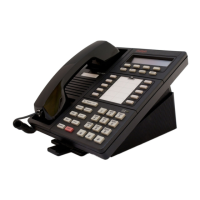MERLIN LEGEND Communications System Release 6.1
System Programming Guide
555-661-111
Issue 1
August 1998
Programming Basics
Page 1-55Product Enhancements
1
■ Voice Mail and Auto Attendant. Private network systems should have
their own local voice mail and/or auto attendant applications as well as their
own external alerts and Music On Hold sources. However, a single auto
attendant can transfer calls throughout the private network. It can answer
only those calls that arrive on the PSTN facilities of the system where it is
connected.
Although many features are available using tie trunks for private network
connectivity, PRI tandem trunks provide greatly enhanced features and faster call
setup. For this reason, PRI is recommended over tie functionality in private
networks.
Group Calling Enhancements 1
Release 6.0 and later systems include Group Calling features that enhance group
calling operations.
Queue Control 1
The system manager can control the maximum number of calls allowed in the
primary calling group queue for calls that arrive on certain facilities often assigned
to calling groups. When the number of the calls in queue reaches the
programmed maximum, subsequent callers receive a busy signal.
Queue control applies to calls received on the following types of facilities:
■ DID (Direct Inward Dialing)
■ PRI facilities programmed for dial-plan routing
■ All calls transferred from a VMI (voice messaging interface) port
■ Dial-in Tie
Queue control also applies to internal calls to a calling group and calls to a calling
group through the QCC.
Internal calls that dial or and are directed to a calling group programmed
as Position-Busy Backup are eligible for queue control. Calls that come in on a
trunk assigned to the Queued Call Console (QCC) are not eligible for queue
control if the call is directed to a calling group designated as Position-Busy
Backup.
Remote-access calls to a calling group, coverage calls directed to a calling group,
calls directed to calling group through QCC Position-Busy backup, and all other
outside calls are not eligible for queue control.
Prompt-Based Overflow 1
System managers can activate the Prompt-Based Overflow option. This option
allows callers waiting in queue and listening to a delay announcement to press the
# key in order to reach the overflow receiver for the group, which may be the QCC
queue or another calling group (including a calling group assigned for a voice mail
system).

